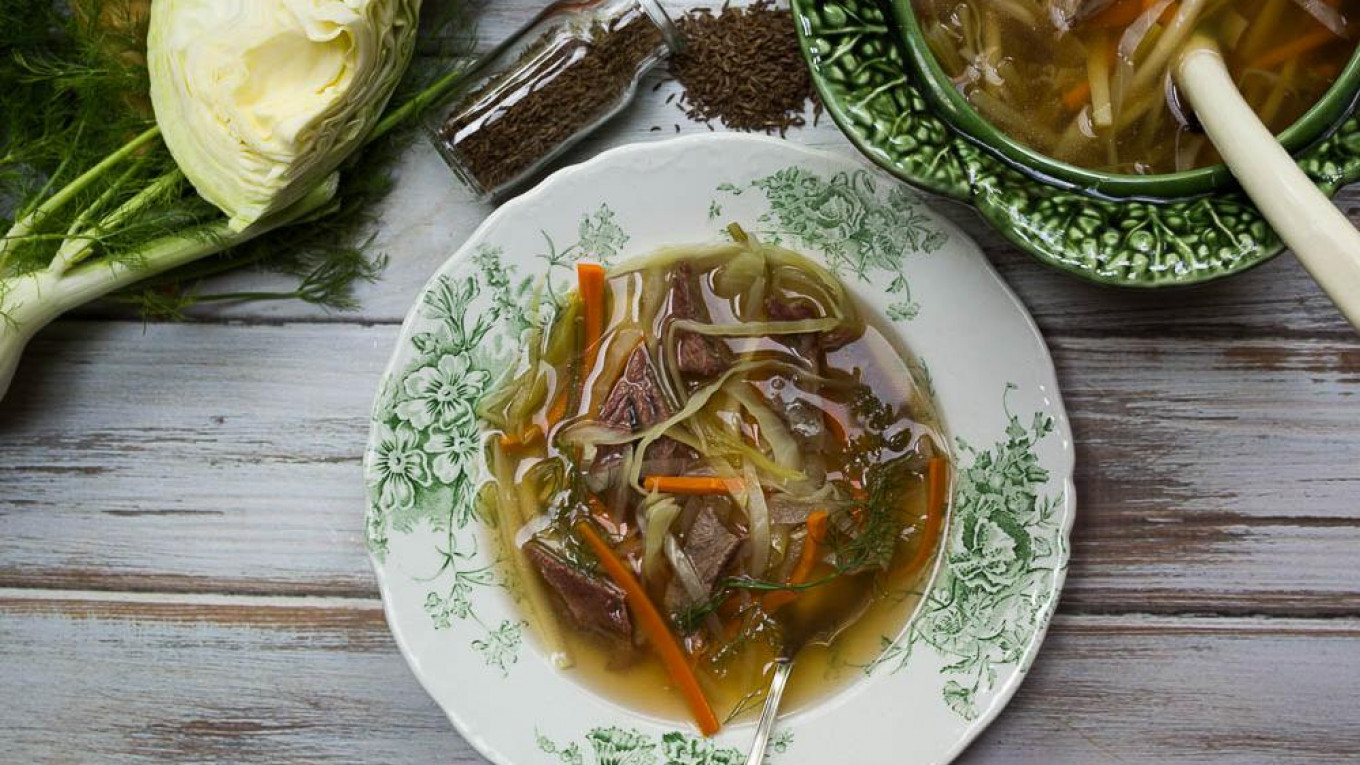More bad news this fall came from Delta Airlines, an organization I relied on to whisk me away to safety should the need ever arise, which announced it was canceling all of its Moscow flights.
The fact that they simultaneously announced the opening of routes to Lagos I put firmly out of my head, as I headed over to my neighborhood watering hole to drown my sorrows in a strong cocktail.
Solace came during the agonizing deliberation between a vodka gimlet with blackberry shrub or a muddled cucumber and thyme fizz with Hedrick’s gin. Times may indeed be tense and the future a little bleak, but the local food scene in Moscow continues on its seemingly unstoppable upward trajectory.
Once upon a time, ordering “a martini” in Russia would have yielded either one of those annoying Slavic shrugs or (far worse) 75-ml of that lurid red or insipid green Italian liqueur that is made in Italy and should stay there.
These days, however, any Moscow barman worth his cocktail onions can shake you up one of those perfect Martinis: the kind that just sort of floats, like an ice-cold mist.
In the two decades that I’ve called Moscow home, I’ve watched long lines of old women waiting nervously for rationed food staples like sugar morph into even longer lines of bearded hipsters queuing up for a bowl of Pho at Danilovsky Market’s chic food outlet gallery.
Moscow’s culinary renaissance began with a perestroika-era rejection of domestic dishes for a wholehearted embrace of international cuisines: Italian, Mexican, African, Middle Eastern, and, of course, the ubiquitous Japanese sushi (still incomprehensible to me), which assures that any 7-year-old Muscovite can adroitly wield a pair of chopsticks.
Mayonnaise out, lemongrass in.
Everything in Russia goes in cycles, and food trends are no exception. On the strength of the burgeoning Russian economy in the “oughts” came a heightened awareness of the origin and quality of raw ingredients, which in turn gave rise to an exciting locavore movement.
Small organic food cooperatives and companies such as LavkaLavka, Farmers’ Bazaar, and Bio Market expanded rapidly, keeping pace with an expanding and increasingly discerning customer base.
This locavore movement was a prelude to what I consider the most exciting development since Count Stroganoff’s chef experimented with sour cream and beef: the return of interest in Russia’s own rich culinary traditions.
The resulting federal cuisine fuses all of the traditions of its predecessors: the hearty “low and slow” braises of traditional Russian peasant fare; the imported French, Italian and Belgian flavors of the complex Imperial cuisine, and the comfort food of the more practical Soviet cuisine.
Modern Moscow chefs have reintroduced updated versions of Russia’s time-honored pickles, preserves, offal, stews, marinated and salted fish, and endless riffs on Russia’s delectable dairy using modern methods of preparation and innovative flavor pairings such as horseradish-spiked berry syrup or caraway-seed infused egg white foam.
Moscow’s culinary renaissance is all the more impressive when you consider that for the past three years, domestic cooks have had no official access to imported foodstuffs from the U.S., Canada, the EU, Japan, and the Antipodes thanks to sanctions imposed on their import by Russia in 2014.
Despite this — or, as I believe, because of it — Moscow’s foodies continue to innovate.
Food markets such as Danilovsky and Dorogomilovsky showcase the growing number of local artisan cheesemakers, organic Angus beef farmers, and craft beer brewers. Fine dining grows unchecked, with White Rabbit earning a coveted mention in the Michelin guide. Who knows what stars may be on the horizon for Moscow’s resilient foodies?
And that calls for another Martini!
Jennifer Eremeeva is an American writer based in Moscow, who writes about Russian history, cuisine, and culture.
This article is part of The Moscow Times' 25th anniversary special print edition. To view the entire issue click here.
A Message from The Moscow Times:
Dear readers,
We are facing unprecedented challenges. Russia's Prosecutor General's Office has designated The Moscow Times as an "undesirable" organization, criminalizing our work and putting our staff at risk of prosecution. This follows our earlier unjust labeling as a "foreign agent."
These actions are direct attempts to silence independent journalism in Russia. The authorities claim our work "discredits the decisions of the Russian leadership." We see things differently: we strive to provide accurate, unbiased reporting on Russia.
We, the journalists of The Moscow Times, refuse to be silenced. But to continue our work, we need your help.
Your support, no matter how small, makes a world of difference. If you can, please support us monthly starting from just $2. It's quick to set up, and every contribution makes a significant impact.
By supporting The Moscow Times, you're defending open, independent journalism in the face of repression. Thank you for standing with us.
Remind me later.







